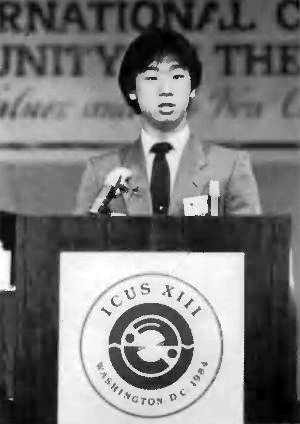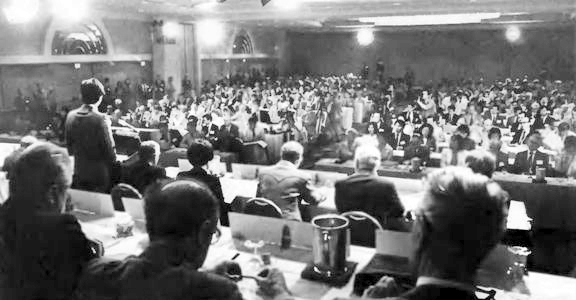![]()
The Words of Sun Myung Moon from 1984
|
|
The Words of Sun Myung Moon from 1984 |

Delivered by Hyo Jin Moon (Reverend Sun Myung Moon was imprisoned at the Federal Correctional Institution in Danbury, Connecticut at the time.)
Honorable chairman, eminent professors and scientists, ladies and gentlemen:
I thank you for participating in the Thirteenth International Conference on the Unity of the Sciences. Even though we cannot physically be together, my heart is with you.
For 13 years I have addressed this assembly of distinguished scholars and have raised questions concerning the state of the world and the responsibility of the scientific and academic communities to solve global problems. While the specific contents of my addresses have varied from year to year, the underlying thematic focus has remained unchanged. This focus is essentially twofold, emphasizing the need for the unity of sciences and of knowledge in general, and the need for science to he guided by absolute values and purpose to assure the welfare of human existence.
God is the source not only of religious truth but also of scientific truth. As I said several years ago at the closing of one of our ICUS meetings, "God is not only the first preacher, but also the first scientist." I firmly believe this is a fundamental truth of the universe, and I have based my life's work on this assumption.
As a minister of the living God, I have sought to enhance, clarify and unify all aspects of God's essential being as manifested in the whole of creation, both physical and spiritual.
The search for the meaning of life as well as the desire to enhance the material well-being of human existence have been the motivating forces behind my lifelong work, despite the many obstacles which have stood in my way since I began my mission at age sixteen.
One of the greatest tragedies now facing the pursuit of knowledge is the fragmentation of the academic disciplines. Such divisive specialization of science and knowledge, like the dismantling of a machine, ultimately paralyzes the function of the whole and prevents science from fulfilling its mission.
Whether we accept it or not, the world is one. It is erroneous to think that one discipline has a more complete view of reality than another, or to think that discoveries and advances in different areas are unrelated. All fields of scientific and academic study are intertwined each having a unique yet partial view of the whole of reality. It is to the advantage of total human progress and happiness that all fields of study harmoniously work together to form an integrated view of reality.
But the view of the unity of science and knowledge about which I speak does not mean simply reducing all knowledge to a single academic discipline. Instead, it is a unity grounded in a fundamental purpose. In science there are many fields, but each aims at the realization of human happiness.
Although fragmentation and divisiveness face the academic world today, there is an even greater menace -- a menace which turns our attention to the second ongoing theme of ICUS: the search for absolute values.
Despite the deep desire and diligent efforts of most scientists and scholars to establish peace and prosperity, poverty, Illiteracy, disease, strife and hostility still prevail in even the most advanced nations. Despite great advances in science and technology, humankind continues to suffer from sorrow, pain and distress.

Many leaders are trying to eliminate this misery and to establish true peace and stability, but the world echoes with empty promises of peace. Neither democratic capitalism nor communistic socialism has solved world problems. Both have allowed secular humanism to reduce human existence to materialism and thus demean the value of life. The so-called free world has allowed this through impotence and a lack of direction; the communist world dictates this through its ideological materialism. Confusion grows as a sense of purposelessness permeates the world.
How has this come about? The main reason is that the standard of value which regulates human behavior has been undermined. As ethics and morality have lost their power, the standard of goodness has all but disappeared. Part of this loss is due to the misguided foundations of science. By attempting to be value-neutral, science has often excluded the questions of humanity and moral values in the process of its development.
Over time science has gradually fractionalized, each field becoming more specialized, analytical and materialistic, thus ignoring the questions of morality and values. Hence, human dominion over science has weakened to the point that no one can be sure of the fate of human existence on this planet.
Another reason for the demise of values and morality is that past standards of value and morality no longer satisfy modern thinking men and women. New, reasonable morals and ethics must arise out of a new standard of values that is clear and applicable to the modern individual. This standard can only be derived from a transcendent, unified system of thought which unifies past and present secular and religious thought.
I have long been interested in the aims of religion, philosophy and science. As I have already stated, these conferences which I have initiated stem from these concerns. While religion has concerned itself with metaphysical and moral questions, science has limited itself to understanding the regularities of nature and the transfer of energy and motion in space and time.
It is true that science has contributed to the tremendous advances in knowledge during the last few hundred years. Nevertheless, science without a standard of value to guide it could lead to global destruction. In my view, the whole range of knowledge from theology to science has no meaning without an understood purpose and a standard of value directing this knowledge.
I believe that this direction and standard of value can only come from God-centered religion. This should not be any surprise to those in the scientific community who are aware of the philosophical writings of many great scientists.
I have proclaimed in earlier addresses at ICUS that Unification theology and ideology can be the foundation of a new, unified thought system centered on God. This ideology states that human beings are intended to have value by nature of their very being. They are each meant to have a unique parent-child relationship with God.
Hence, all people are created to lead life with a definite value perspective in accordance with God's purpose of creation: the establishment of true love relationships. In fact, I propose that the absolute values which we seek are grounded in the absolute true love of God. It is on the foundation of true love that the values of absolute truth, beauty and goodness are formed.
My ardent wish is that all scientists and scholars develop their respective fields on the basis of a solid view of moral values, thus exalting human dignity by adopting a spiritual and unified method as well as a materialistic and analytical one.
Solutions to the world's problems can only come about through this holistic approach to human existence. Rather than the clash of fragmented approaches and ideals, a harmonious effort centered on effective wisdom and knowledge is required of the many distinguished scholars gathered at this conference.
I sincerely hope that this conference will contribute to the ideals which God intended to realize at the time of the creation, and to provide solutions to global concerns. May your efforts become a decisive, contributing factor toward the realization of the new cultural revolution culminating in a world of true love, goodness, peace and happiness.
Thank you very much.